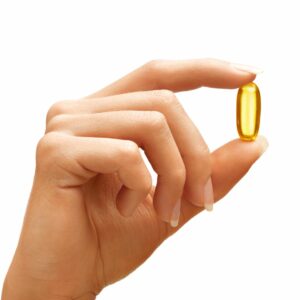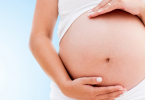Research shows that omega-3 fatty acids may be a promising natural therapy for perinatal depression.
Perinatal depression
Laura sits huddled on the floor in the corner of the bathroom. She sobs and sobs and is completely desperate. It goes like this every day, even though this time in her life should actually be one of the happiest. She recently gave birth to a healthy baby and although she loves him dearly, there is always this dark desperation. Total exhaustion, overwhelmed, helpless, and always ashamed.
That’s why it’s so difficult to get help. The other parent works a lot, so at least she doesn’t have to worry about money. At the same time, this means that no help can be expected from this direction. Laura doesn’t dare to confide in anyone about her needs. She probably doesn’t really realize that she, like many other women in her situation, suffers from postpartum depression
Perinatal depression and anxiety are common, with prevalence rates for major and minor depression of up to almost 20% during pregnancy and the first 3 months postpartum. In Fact, post partum depression is considered the most common complication of childbirth
The severity of symptoms can vary from mild to severe and may include persistent and deep feelings of sadness or despair, loss of interest in activities that previously brought joy, sleep problems, persistent fatigue, exhaustion, and a sense of physical weakness, changes in appetite, increased levels of anxiety or irritability with individuals feeling easily stressed or overwhelmed, difficulty concentrating, negative self-evaluations, feelings of guilt, and a sense of failing as a mother or partner and finally, social withdrawal.
It is crucial to emphasize that perinatal depression cannot be solely explained by normal mood swings or the emotional challenges of motherhood. If women or their loved ones notice signs of depression during pregnancy or after childbirth, seeking professional help is important. Early intervention and support can help mitigate the impact of perinatal depression and promote the health of both mother and child.
Causes of perinatal depression
Perinatal depression can be caused by a variety of factors, and experts discuss various causes that may occur individually or in combination.
A family history of depression or other mental illnesses may increase the risk of perinatal depression, just like a personal history of mental health problems before pregnancy. Stressful life events during pregnancy such as financial problems, relationship problems, job stress or the loss of a loved one can increase the risk of perinatal depression. Not surprisingly, a lack of support, whether from family, friends or a partner, can increase the risk of perinatal depression as well. This is particularly true given that being a new mother is a huge challenge in itself. It is by no means easy to adjust to the new situation and cope with sleep deprivation during the first months.
In addition to that, more and more studies are showing that depression does not originate solely in the psyche. Both our hormonal status and our immune system impact our emotional state very significantly.
Fluctuations in hormones, particularly estrogen and progesterone, during pregnancy and postpartum are known to affect mood. A rapid decline in these hormones after birth is often associated with the onset of postpartum depression.
Immunological processes in the body impact our psychological wellbeing via inflammatory mediators. Surely you have already experienced this yourself: Don‘t you, too, feel the need to withdraw when you are ill or have hurt yourself, feeling rather listless?
Treatment of perinatal depression
It’s important for individuals experiencing perinatal depression to seek help from healthcare professionals such as obstetricians, gynecologists, psychiatrists, or mental health specialists. Early detection and intervention can significantly improve outcomes for both mother and child. Every treatment plan should be tailored to the individual’s specific needs and circumstances.
Treatment options for perinatal depression typically involve a combination of psychotherapy and medication, and will often also aim to alter circumstances (eg more support for the mother, so she can get enough sleep) and lifestyle (healthy nutrition and regular exercise have been found to improve emotional wellbeing).
However, when it comes to medication, mothers prioritize avoiding chemical medications during pregnancy and breastfeeding. Thus the search for alternative, natural treatments becomes crucial.
Interesting alternative from nature: omega-3 fatty acids
This is where omega-3 fatty acids come into the picture. Omega-3 fatty acids are a type of polyunsaturated fat that is essential for various bodily functions. They are considered essential because the human body cannot produce them on its own, and they must be obtained through dietary sources (fish, nuts, seeds, fish oil supplements). There are three main types of omega-3 fatty acids:
- Alpha-Linolenic Acid (ALA): Found in plant-based sources like flaxseeds, chia seeds, and walnuts.
- Eicosapentaenoic Acid (EPA): Predominantly found in fatty fish like salmon, mackerel, and sardines.
- Docosahexaenoic Acid (DHA): Also found in fatty fish, especially in higher concentrations in fish oil supplements.
Omega-3 fatty acids have been linked to cardiovascular health, joint health, vision support, inflammation reduction and brain health. Pregnant women are generally advised to make sure to take up enough omega-3 fatty acids, as they are important for the development for the baby’s vision and brain. For many women, fish oil supplements are a convenient way to increase omega-3 intake, especially for those who don’t consume fish regularly.
While the efficacy of omega-3 fatty acids (FA) in treating major depressive disorder is already well-established, their role as natural therapy in perinatal depression remains unclear. However, a recent systematic review of randomized placebo-controlled trials sheds light on the potential of omega-3 FA in alleviating perinatal depressive symptoms.

Study on omega-3s for perinatal depression
To get a better idea of the current scientific data on using omega-3 supplements for women with perinatal depression, researchers from China conducted a comprehensive search of science databases including PubMed, Embase, PsycINFO, MEDLINE, Cochrane Library, and CINAHL up to November 2019. The study included eight eligible randomized placebo-controlled trials (the gold standard of science) involving 638 participants. The primary objective was to assess the efficacy and safety of omega-3 FA therapy in perinatal women with depressive symptoms.
Key findings from research
Let’s have a look at the main findings of Dr Zhang and colleagues‘ work, which was pubslished in a peer-reviewed international magazine in 2020:
Significant Improvement in Perinatal Depression: The study revealed a significant positive effect of omega-3 FA on perinatal depression. This suggests that incorporating omega-3 supplementation into the treatment plan could be beneficial for perinatal women experiencing depressive symptoms.
Effective in Both Pregnant and Postpartum Women: Regardless of whether women were pregnant or postpartum, omega-3 FA showed a positive impact on depressive symptoms. This versatility makes omega-3 supplementation a potential intervention throughout the perinatal period.
Low Incidence of Side Effects: Omega-3 supplementation, particularly with a higher EPA/DHA ratio, was found to be well-tolerated, with a low incidence of side effects. This is a promising aspect as safety is a critical consideration in any treatment regimen, especially during pregnancy and postpartum.
No Significant Difference in Adverse Events: Trials reporting adverse effects demonstrated no significant difference in the incidence of gastrointestinal and neurologic events between the omega-3 and placebo groups. This suggests that omega-3 supplementation is not associated with an increased risk of adverse events in perinatal women.
Publication Bias Absent: The absence of publication bias further supports the credibility of the findings, enhancing the reliability of the conclusion drawn from the study.
In summary: This is how important omega-3s are during pregnancy and the postpartum period
In conclusion, the findings from this systematic review of randomized placebo-controlled trials suggest that omega-3 FA supplementation is a promising intervention for perinatal depression. The efficacy, safety, and low incidence of side effects make omega-3s an attractive option for perinatal women with depressive symptoms.
While it is not entirely clear yet how this positive effect is exactly brought about, one may speculate that it is omega-3s important role both in brain health and inflammation reduction (this way acting on our immune function) which contribute to the observed improvements in mental health and wellbeing.
Given omega-3’s essential role both for baby’s and mum’s health, getting enough omega-3s during pregnancy and breastfeeding is a key factor for health care from the very beginning.
So if you are pregnant or breastfeeding, make sure you get enough rest and support and ample precious omega-3s either from food sources or high-quality supplements 😍

References
Bai S, Guo W, Feng Y, Deng H, Li G, Nie H, Guo G, Yu H, Ma Y, Wang J, Chen S, Jing J, Yang J, Tang Y, Tang Z. Efficacy and safety of anti-inflammatory agents for the treatment of major depressive disorder: a systematic review and meta-analysis of randomised controlled trials. J Neurol Neurosurg Psychiatry. 2020 Jan;91(1):21-32. doi: 10.1136/jnnp-2019-320912. Epub 2019 Oct 28. PMID: 31658959.
Dlamini LP, Amelia VL, Shongwe MC, Chang PC, Chung MH. Antenatal depression across trimesters as a risk for postpartum depression and estimation of the fraction of postpartum depression attributable to antenatal depression: A systematic review and meta-analysis of cohort studies. Gen Hosp Psychiatry. 2023 Nov-Dec;85:35-42. doi: 10.1016/j.genhosppsych.2023.09.005. Epub 2023 Sep 17. PMID: 37742599.
O’Hara MW, Wisner KL. Perinatal mental illness: definition, description and aetiology. Best Pract Res Clin Obstet Gynaecol. 2014 Jan;28(1):3-12. doi: 10.1016/j.bpobgyn.2013.09.002. Epub 2013 Oct 7. PMID: 24140480; PMCID: PMC7077785.
Zhang MM, Zou Y, Li SM, Wang L, Sun YH, Shi L, Lu L, Bao YP, Li SX. The efficacy and safety of omega-3 fatty acids on depressive symptoms in perinatal women: a meta-analysis of randomized placebo-controlled trials. Transl Psychiatry. 2020 Jun 17;10(1):193. doi: 10.1038/s41398-020-00886-3. PMID: 32555188; PMCID: PMC7299975.







